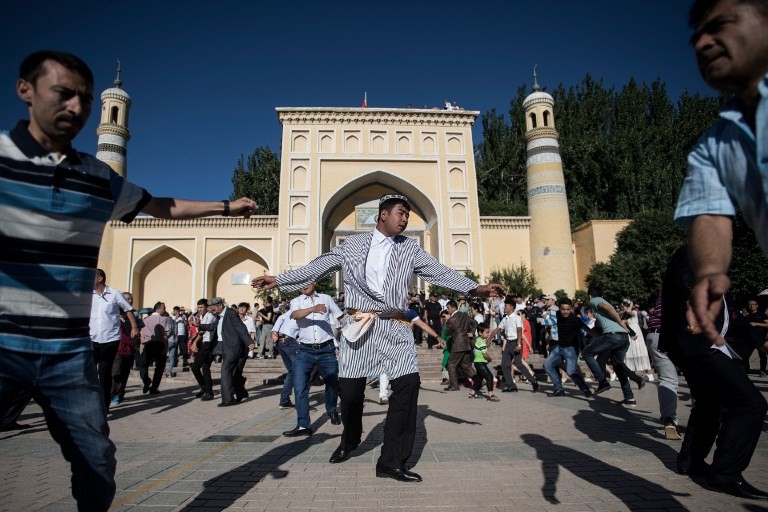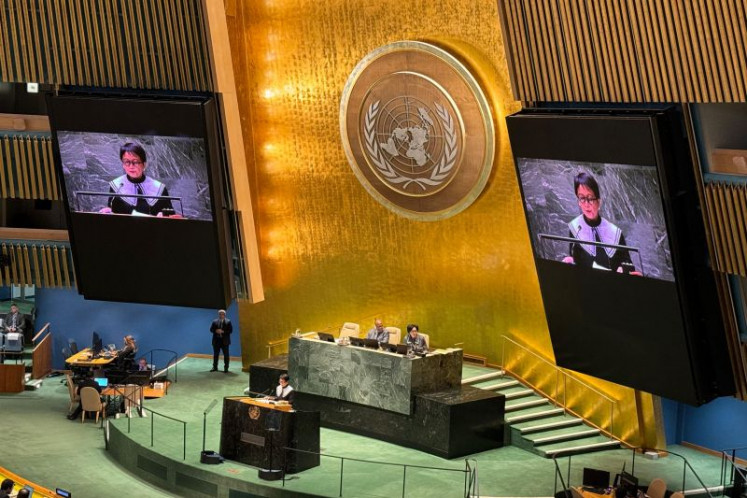Xinjiang, what a wonderful place
In Xinjiang, there are around 14 million Muslims, 24,400 mosques and 29,000 clerical personnel.
Change Size
 This picture taken on June 26, 2017 shows men dancing in front of the Id Kah Mosque after the morning prayer on Eid al-Fitr in the old town of Kashgar in China's Xinjiang Uighur Autonomous Region. (Agence France -Presse/Johannes Esielle)
This picture taken on June 26, 2017 shows men dancing in front of the Id Kah Mosque after the morning prayer on Eid al-Fitr in the old town of Kashgar in China's Xinjiang Uighur Autonomous Region. (Agence France -Presse/Johannes Esielle)
“Xinjiang, What a Wonderful Place” is a popular folk song in China that describes the beauty of Xinjiang’s countryside and pastures, the fragrance of local fruits, the solidarity between ethnic groups and the rhythmic music and dance. The song makes people feel as if they are actually in Xinjiang and are loved by friends from around the world.
The wonders of Xinjiang lie not only in its vast landmass, breath-taking scenery or abundant resources, but also in the mutual respect, solidarity and harmony among ethnic groups, cultures and beliefs and the shared aspiration to build a better home.
Xinjiang is home to 13 ethnic groups, six major religions and more than 24 million citizens. It would not have been possible to achieve harmony and inclusive development in such a diverse region without the ethnic and religious policy upheld by the Chinese government, especially its policy on freedom of religious belief.
As clearly stipulated in the Chinese Constitution, citizens of the People’s Republic of China enjoy freedom of religious belief. The Chinese government respects and protects citizens’ freedom of religious belief in accordance with the Constitution. In Xinjiang, there are around 14 million Muslims, 24,400 mosques and 29,000 clerical personnel.
Governments at all levels in Xinjiang fully respect the religious feelings and needs of citizens and protect normal religious activities in accordance with the law. During each year’s holy month of Ramadan, efforts are made to ensure sufficient supply of goods at a reasonable price and to guarantee food safety. Whether to open or close a halal restaurant is entirely at the discretion of its owner without any interference.
The mosques, which are capable of providing medical services and equipped with cooling equipment, offer free iftar or breaking of the fast meals for those who fast. Every year, chartered flights are arranged for thousands of Muslims to go to Mecca together with doctors, chefs, tour guides, translators and other staff to provide necessary services.
Special funds are allocated to repair and renovate religious sites, including Id Kah Mosque in Kashi and Juma Mosque in Hotan, which are also under state protection as historical sites. The representatives of religious communities enjoy full rights to participate in the deliberation and administration of state affairs through the people’s congresses and the people’s political consultative conferences at various levels.
Many Indonesian friends also set a high value on the freedom of religious belief and happy life enjoyed by Muslims in Xinjiang.
The chairman of Indonesia’s largest Muslim organization Nahdlatul Ulama (NU), Said Aqil Siradj, who once attended religious services with local Muslims in Yanghang Mosque in Urumqi, spoke highly of the efforts undertaken by the Chinese government to protect the freedom of religious belief as well as to support and facilitate Muslims in fulfilling religious duties.
Press photographer Ismail from Antara, Indonesia’s state news agency, participated in the Xinjiang Through My Lens photography trip and captured the spectacular celebration of Ramadan in Xinjiang with his camera. The trip was an eye-opening experience that deepened his knowledge of Xinjiang.
When vividly recalling his recent trip to Xinjiang, detik.com journalist Faya said what impressed him the most were the local government’s efforts to build infrastructure, preserve traditional culture and protect normal religious activities.
[...] risks still simmer beneath the surface as some people try to spread religious extremism in Xinjiang.
As the policy on freedom of religious belief is fully implemented, various ethnic groups and religions enjoy harmony, equality and amity. Yet, risks still simmer beneath the surface as some people try to spread religious extremism in Xinjiang and commit acts of terror and violence, hurting innocent citizens of all ethnic groups, including the religious people. What they have committed is antihuman, antisocial, anticivilization and antireligion in nature. In fact, a great many of countries are faced with such a wrong ideological trend.
Religious radicalism and terrorism are the common enemy of all mankind. Countries should work together to deal with such challenges. But regrettably, a few institutions and people from the West pursue double standards, deliberately distorting the facts, speculating on the so-called “re-education camps” and misrepresenting Chinese government’s efforts to prevent religious extremism and promote deradicalization.
In fact, the measures taken by the local governments in Xinjiang aim to address both the symptoms and root causes, namely by keeping the misguided people away from religious extremism and enabling them to better integrate into society through vocational training.
Furthermore, to promote stability, development and people’s livelihood, Xinjiang has stationed officials in villages to work on poverty alleviation and strengthen paired assistance between local officials and citizens as well as between Xinjiang and other developed provinces. By doing so, Xinjiang has taken a fundamental approach in maintaining lasting social stability.
We Chinese people often say, “Seeing is believing”. To make an objective appraisal of Xinjiang, one cannot just rely on hearsay or simply follow another’s lead in voicing opinions. Instead, one needs to trust his or her own experiences and feelings. We warmly welcome our Indonesian friends to visit Xinjiang and take a look for yourselves. I believe by then you would agree as well that Xinjiang is indeed a wonderful place.
***
The writer is Chinese Ambassador to Indonesia.









